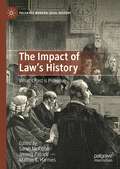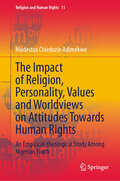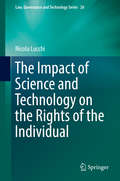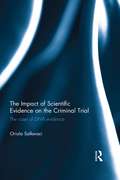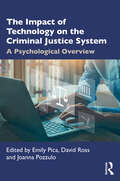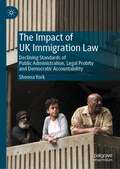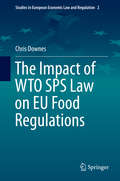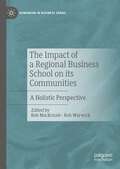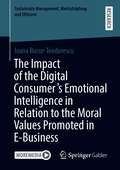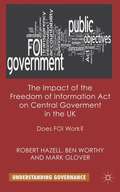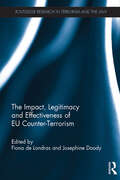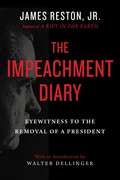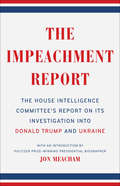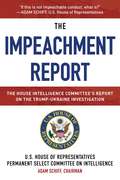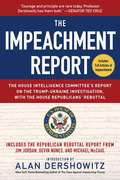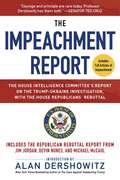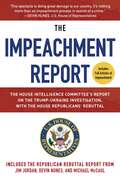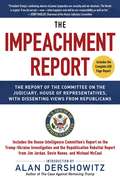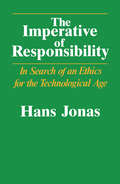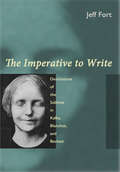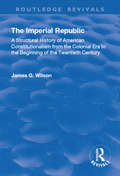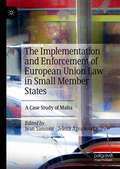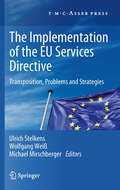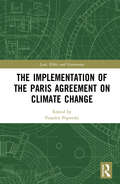- Table View
- List View
The Impact of Law's History: What’s Past is Prologue (Palgrave Modern Legal History)
by Marcus K. Harmes Sarah McKibbin Jeremy PatrickThis book considers how legal history has shaped and continues to shape our shared present. Each chapter draws a clear and significant connection to a meaningful feature of our lives today. Focusing primarily on England and Australia, contributions show the diversity of approaches to legal history’s relevance to the present. Some contributors have a tight focus on legal decisions of particular importance. Others take much bigger picture overview of major changes that take centuries to register and where impact is still felt. The contributors are a mix of legal historians, practising lawyers, members of the judiciary, and legal academics, and develop analysis from a range of sources from statutes and legal treatises to television programs. Major legal personalities from Edward Marshall Hall to Sir Dudley Ryder are considered, as are landmarks in law from the Magna Carta to the Mabo Decision.
The Impact of Religion, Personality, Values and Worldviews on Attitudes Towards Human Rights: An Empirical-theological Study Among Nigerian Youth (Religion and Human Rights #11)
by Modestus Chiedozie AdimekweThis book provides a rigorous investigation into the adoption and culture of human rights in Nigeria, with a focus on the human rights attitudes of Nigerian students. Exploring the perceived paradox of enthusiastic endorsement of human rights instruments and their poor application in Nigeria, the author uses an empirical-theological research design to understand how young people in Nigeria evaluate human rights and which factors trigger their evaluation. In doing so, this book is the first to empirically examine the predictors of human rights attitudes among Nigerians and provides new insights into the degree of social significance of the religiosity of adolescents in the country. It also offers a compelling quantitative analysis differences in human rights attitudes among Nigerian youth along religious lines. Given the importance of a culture of human rights in our increasingly diverse societies and the salience of religion on this matter in Nigeria, and across the Africancontinent, this book provides a valuable perspective on the interrelationships between religion, value orientations, personality traits, socio-political context, and human rights. Being concerned with the future of human rights in Nigeria, the author argues that it is crucial to understand ‘the religious factor’ among Nigerian students today. This book is therefore recommended to educators, especially teachers of Religion Education, and scholars working in educational settings, but will also be of interest to researchers in social sciences, public administrators, and policymakers.
The Impact of Science and Technology on the Rights of the Individual
by Nicola LucchiThevolume is devoted to the relevant problems in the legal sphere, created andgenerated by recent advances in science and technology. In particular, itinvestigates a series of cutting-edge contemporary and controversialcase-studies wherescientific and technological issues intersect withindividual legal rights. The book addresses challenging topics at theintersection of communication technologies and biotech innovations such asfreedom of expression, right to health, knowledge production, Internet contentregulation, accessibility and freedom of scientific research.
The Impact of Scientific Evidence on the Criminal Trial: The Case of DNA Evidence
by Oriola SallavaciThis book explores challenges posed by the use of DNA evidence to the traditional features, procedures and principles of the criminal trial. It examines the limitations of existing theories of criminal trial processes in the face of increasing use of scientific evidence in the court room. The research elucidates the interconnections at trial of three epistemologies, namely legal reasoning, as represented by counsel and trial judge, common sense manifested by the jury and scientific reasoning expounded by the expert witness. Sallavaci argues that while scientific reasoning is part of this hybrid of trial languages and practices, its extended use is producing specifically novel tensions which impact on the traditional criminal trial landscape. Through the lens of DNA evidence, the book investigates how far the use of scientific evidence in the fact finding process poses challenges for the adversarial character of the proceedings and rules of evidence; how it affects the role of the judge, jury and expert witness, as well as the principle of orality and continuity of the trial. In comparing the challenges faced in English common law trials to those of the USA, this book has international scope, and will be of great use and interest to students and researchers of Criminal Law and Practice, Policing, and the role of Forensics in Law.
The Impact of Technology on the Criminal Justice System: A Psychological Overview
by David Ross Joanna Pozzulo Emily PicaThis comprehensive volume explores the impact of emerging technologies designed to fight crime and terrorism. It first reviews the latest advances in detecting deception, interrogation, and crime scene investigation, before then transitioning to the role of technology in collecting and evaluating evidence from lay witnesses, police body cameras, and super-recognizers. Finally it explores the role of technology in the courtroom with a particular focus social media, citizen crime sleuths, virtual court, and child witnesses. It shines light on emerging issues, such as whether new norms have been created in the emergence of new technologies and how human behaviour has shifted in response. Based on a global range of contributions, this volume provides an overview of the technological explosion in the field of law enforcement and discusses its successes and failures in fighting crime. It is valuable reading for advanced students in forensic or legal psychology and for practitioners, researchers, and scholars in law, criminal justice, and criminology.
The Impact of UK Immigration Law: Declining Standards of Public Administration, Legal Probity and Democratic Accountability
by Sheona YorkThis book provides an insightful analysis of recent developments in immigration, asylum and citizenship law in the broader social and political context. Written accessibly by an experienced practitioner, it critically examines the development of UK immigration control since the second world war, identifying and focusing on the grievous collateral damage being caused to the rule of law and to society. It examines the decline in standards of public administration, the secular failure to follow the rule of law, and the related issues of social corrosion and lack of democratic accountability. Speaking to academics, practitioners, policy makers and all those concerned about the impact of the hostile environment, it makes proposals for legal changes which prioritise social cohesion: a shared burden of proof, a simple regularisation scheme and clear path to citizenship, and details how these would operate in practice.
The Impact of WTO SPS Law on EU Food Regulations
by Chris DownesThis book brings a fresh perspective on the emerging field of international food law with the first detailed analysis of the process and implications of domestic compliance with the World Trade Organisation (WTO) Sanitary and Phytosanitary (SPS) Agreement. It investigates the influence of WTO disciplines on the domestic policy-making process and examines the extent to which international trade law determines European Union (EU) food regulations. Following controversial WTO rulings on genetically-modified foods and growth hormones in beef, awareness and criticism of global rules governing food has grown considerably. Yet the real impact of this international legal meta-framework on domestic regulations has remained obscure to practitioners and largely unexplored by legal commentators. This book examines the emergence of transnational governance practices set in motion by the SPS Agreement and their role in facilitating agricultural trade. In so doing, it complements and challenges conventional accounts of the SPS regime dominated by analysis of WTO disputes. It reviews legal commentary of the SPS Agreement to understand why WTO rules are so commonly characterised as a significant threat to domestic food policy preferences. It then takes on these assumptions through an in-depth review of food policies and decision-making practices in the EU, revealing both the potential and limits of WTO law to shape EU policies. It finally examines two important venues for the generation of global food norms - the WTO SPS Committee and Codex Alimentarius - to evaluate the practice and significance of transnational governance in this domain. Through detailed case studies including novel foods, food additives, vitamin and mineral supplements and transparency and equivalence procedures, this book provides a richer account of compliance and exposes the subtle, but important influence of WTO obligations.
The Impact of a Regional Business School on its Communities: A Holistic Perspective (Humanism in Business Series)
by Bob MacKenzie Rob WarwickThe place and impact of large, elite business schools is hotly debated. Compared to such establishments, little has been written about smaller, regional, community-oriented business schools that serve and interact with their various communities at home or abroad.Focusing on one of the smaller regional business schools in the UK, and incorporating perspectives from further afield, this book seeks to redress that balance. This local focus enables a more holistic understanding of what really goes on in terms of the complex relationships, practices, challenges and contexts at play in such an arena. The book, conceived throughout the Covid-19 pandemic, reverberates with a multiplicity of voices, perspectives and narratives, and reflects a process of collaborative autoethnography and critical friendship. It will be of great value to academics, students and others who are interested in optimising the benefits of regional business schools around the world.
The Impact of the Digital Consumer's Emotional Intelligence in Relation to the Moral Values Promoted in E-Business (Sustainable Management, Wertschöpfung und Effizienz)
by Ioana Bucur-TeodorescuThe study on the impact of the digital consumer's emotional intelligence based on the moral values promoted in e-business presents an actual interdisciplinary topic in the context of the digital age. The research proposes an original approach to e-business and digital consumer in terms of moral values and emotional intelligence. The Internet has positive effects on consumers and organizations when it is used properly to improve the quality of life. New consumers are more selective, receptive and interested in new technologies. Digital consumers have the opportunity to get informed quickly about products/services offers and e-business provides a simplified acquisition process through diversity and accessibility.
The Impact of the Freedom of Information Act on Central Government in the UK
by Robert Hazell Ben Worthy Mark GloverBased on interviews with officials, requesters and journalists, as well as a survey of FOI requesters and a study of stories in the national media, this book offers a unique insight into how the Freedom of Information Act 2000 really works.
The Impact, Legitimacy and Effectiveness of EU Counter-Terrorism (Routledge Research in Terrorism and the Law)
by Fiona de Londras and Josephine DoodyCounter-terrorism law and policy has been prominent and widespread in the years following 9/11, touching on many areas of everyday life from policing and border control to financial transactions and internet governance. The European Union is a major actor in contemporary counter-terrorism, including through its development of counter-terrorism laws for application within the Union. This book undertakes a multi-disciplinary and empirically informed analysis of the impact, legitimacy and effectiveness of EU counter-terrorism. Taking into account legal, societal, operational and democratic perspectives, this collection connects theoretical and practical perspectives to produce an interdisciplinary and multi-stakeholder study of how we might measure and understand the impact, legitimacy and effectiveness of EU counter-terrorism. Bringing together a select group of experts in the field, particular emphasis is placed on understanding the practical experience of implementing and assessing these measures gathered from and with end users, including law-makers, policy-makers, security services, industry partners and civil society. This edited collection will be of great relevance to scholars and policy makers with an interest in counter-terrorism law, EU law and security studies.
The Impeachment Diary: Eyewitness to the Removal of a President
by James RestonThis eyewitness account of the impeachment process against Richard Nixon holds lessons for our own time. James Reston, Jr., took leave from teaching during the summer of 1973 to witness the Senate Watergate Committee hearings as he worked with his coauthor on what became the first full-length book to advocate for Richard Nixon's impeachment. During the following summer, he returned to Washington, DC, to witness the final act of the impeachment drama, attending the Watergate trials, Supreme Court deliberations over executive privilege, and House Judiciary Committee hearings to consider and eventually vote on articles of impeachment. In the exciting days after the smoking gun tape was revealed, Reston joined the throng of reporters at the White House, hungry for news of Nixon's response. When he arrived in Washington, he decided to keep a diary. The Impeachment Diary is his contemporaneous account of those heady, uncertain times: when a president, having been investigated by a special counsel and Congress, was called to account for acts contrary to his oath and office, and fundamental questions about the Constitution were engaged. The diary offers lessons—both insights and cautions—for our own time. Former solicitor general of the United States and constitutional scholar Walter Dellinger has provided an introduction discussing the nature and meaning of impeachment and helping to draw the links between then and now.
The Impeachment Report: The House Intelligence Committee's Report on Its Investigation into Donald Trump and Ukraine
by The House Intelligence CommitteeThe official report from the House Intelligence Committee on Donald Trump’s secret pressure campaign against Ukraine, featuring an exclusive introduction by Pulitzer Prize–winning author and biographer Jon Meacham For only the fourth time in American history, the House of Representatives has conducted an impeachment inquiry into a sitting United States president. This landmark document details the findings of the House Intelligence Committee's historic investigation of whether President Donald J. Trump committed impeachable offenses when he sought to have Ukraine announce investigations of former vice president Joe Biden and his son Hunter. Penetrating a dense web of connected activity by the president, his ambassador Gordon Sondland, his personal attorney Rudolph Giuliani, and many others, these pages offer a damning, blow-by-blow account of the president’s attempts to “use the powers of his office to solicit foreign interference on his behalf in the 2020 election” and his subsequent attempts to obstruct the House investigation into his actions. Published here with an introduction offering critical context from bestselling presidential historian Jon Meacham, The Impeachment Report is necessary reading for every American concerned about the fate of our democracy.
The Impeachment Report: The House Intelligence Committee's Report on the Trump-Ukraine Investigation
by U.S. House Permanent Select Committee on IntelligenceThe Official Impeachment Inquiry Report on The Results of The Trump-Ukraine Investigation, from The U.S. House Of Representatives Permanent Select Committee on Intelligence. This groundbreaking report—released by the U.S. House Of Representatives Permanent Select Committee on Intelligence, chaired by Adam Schiff—contains the results of the impeachment inquiry into President Donald Trump&’s actions as he sought for Ukraine to announce investigations into Hunter Biden, as well as the Committee&’s conclusions about whether those actions are impeachable offenses. Covering topics ranging from the anonymous whistleblower&’s first attempts to spread the word about Trump&’s phone call with Ukrainian President Volodymyr Zelensky, to the Congressional testimony of Trump&’s advisors and ambassadors, to the statements of Rudy Giuliani and William Barr, and even the President&’s efforts to influence the inquiry, The Impeachment Report offers readers the full findings of the Intelligence Committee&’s investigation. It is the ultimate resource for anyone who wants to know whether impeachment is warranted, and is a critical text in the ongoing back-and-forth battle to protect American democracy.
The Impeachment Report: The House Intelligence Committee's Report on the Trump-Ukraine Investigation, with the House Republicans' Rebuttal
by U.S. House Permanent Select Committee on IntelligenceWith an Introduction by Acclaimed Legal Scholar and New York Times Bestselling author Alan Dershowitz, The Official Impeachment Inquiry Report on The Results of The Trump-Ukraine Investigation—Plus the Articles of Impeachment and the Republican Report Disputing the Results of the Democratic Investigation. Donald Trump is on the verge of being only the third US President impeached by the House of Representatives, but is this a case of a president abusing his power and obstructing justice, or is it a partisan witch hunt protecting the Deep State? Can you trust the mainstream media, or do you want to read the Report for yourself? This groundbreaking report—released by the U.S. House Of Representatives Permanent Select Committee on Intelligence, chaired by Adam Schiff—contains the results of the impeachment inquiry into President Donald Trump&’s actions as he sought for Ukraine to announce investigations into Hunter Biden, as well as the Committee&’s conclusions about whether those actions are impeachable offenses. Covering topics ranging from the anonymous whistleblower&’s first attempts to spread the word about Trump&’s phone call with Ukrainian President Volodymyr Zelensky, to the Congressional testimony of Trump&’s advisers and ambassadors, to the statements of Rudy Giuliani and William Barr, and even the President&’s efforts to influence the inquiry, The Impeachment Report offers readers the full findings of the Intelligence Committee&’s investigation, the articles of impeachment themselves, a rebuttal report from Republican representatives that disputes the process and results of the Democratic investigation, an introduction by esteemed attorney Alan Dershowitz, and information about the impeachment process itself. It is the ultimate resource for anyone who wants to know whether impeachment is warranted, and is a critical text in the ongoing back-and-forth battle to protect American democracy.
The Impeachment Report: The House Intelligence Committee's Report on the Trump-Ukraine Investigation, with the House Republicans' Rebuttal
by U.S. House Permanent Select Committee on IntelligenceThe Official Impeachment Inquiry Report on The Results of The Trump-Ukraine Investigation—Plus the Articles of Impeachment and the Republican Report Disputing the Results of the Democratic Investigation, as well as an Introduction by Acclaimed Legal Scholar Alan Dershowitz This groundbreaking report—released by the U.S. House Of Representatives Permanent Select Committee on Intelligence, chaired by Adam Schiff—contains the results of the impeachment inquiry into President Donald Trump&’s actions as he sought for Ukraine to announce investigations into Hunter Biden, as well as the Committee&’s conclusions about whether those actions are impeachable offenses. Covering topics ranging from the anonymous whistleblower&’s first attempts to spread the word about Trump&’s phone call with Ukrainian President Volodymyr Zelensky, to the Congressional testimony of Trump&’s advisers and ambassadors, to the statements of Rudy Giuliani and William Barr, and even the President&’s efforts to influence the inquiry, The Impeachment Report offers readers the full findings of the Intelligence Committee&’s investigation, the articles of impeachment themselves, a rebuttal report from Republican representatives that disputes the process and results of the Democratic investigation, an introduction by esteemed attorney Alan Dershowitz, and information about the impeachment process itself. It is the ultimate resource for anyone who wants to know whether impeachment is warranted, and is a critical text in the ongoing back-and-forth battle to protect American democracy.
The Impeachment Report: The House Intelligence Committee's Report on the Trump-Ukraine Investigation, with the House Republicans' Rebuttal
by U.S. House Permanent Select Committee on IntelligenceThe Official Impeachment Inquiry Report on The Results of The Trump-Ukraine Investigation—Plus the Articles of Impeachment and the Republican Report Disputing the Results of the Democratic Investigation This groundbreaking report—released by the U.S. House Of Representatives Permanent Select Committee on Intelligence, chaired by Adam Schiff—contains the results of the impeachment inquiry into President Donald Trump&’s actions as he sought for Ukraine to announce investigations into Hunter Biden, as well as the Committee&’s conclusions about whether those actions are impeachable offenses. Covering topics ranging from the anonymous whistleblower&’s first attempts to spread the word about Trump&’s phone call with Ukrainian President Volodymyr Zelensky, to the Congressional testimony of Trump&’s advisers and ambassadors, to the statements of Rudy Giuliani and William Barr, and even the President&’s efforts to influence the inquiry, The Impeachment Report offers readers the full findings of the Intelligence Committee&’s investigation, the articles of impeachment themselves, a rebuttal report from Republican representatives that disputes the process and results of the Democratic investigation, and information about the impeachment process itself. It is the ultimate resource for anyone who wants to know whether impeachment is warranted, and is a critical text in the ongoing back-and-forth battle to protect American democracy.
The Impeachment Report: The Report of the Committee on the Judiciary, House of Representatives, with Dissenting Views from Republicans
by U.S. House Committee on the JudiciaryThe Official Report of the House Judiciary Committee on the Impeachment—Plus the Dissenting Views from Republicans, the full Impeachment Inquiry Report on The Results of The Trump-Ukraine Investigation, the Articles of Impeachment and the Republican Report Disputing the Results of the Democratic Investigation, as well as an Introduction by Acclaimed Legal Scholar Alan Dershowitz This groundbreaking report—released by the US House Committee on the Judiciary, chaired by Jerry Nadler—contains the results of the impeachment inquiry into President Donald Trump&’s actions as he sought for Ukraine to announce investigations into Hunter Biden, as well as an explanation of the committee's process and its justification for recommending two articles of impeachment against Trump, abuse of power and obstruction of Congress. This new report, separated into four parts, details the process by which the House Intelligence Committee investigated the case against Trump. Part Two is dedicated to examining the standards of impeachment laid out in the Constitution. Part Three delves into the proof and details of the Democrats' case that Trump abused the power of his office to pressure the Ukrainian government to investigate his political rival and interfere in the 2020 presidential election. Finally, Part Four makes the case that President Trump obstructed Congress's ability to hold the executive branch accountable by defying House investigators' requests for documents and testimony. Besides including the House Judiciary Committee's full report, The Impeachment Report also presents the Dissenting Views from Republicans, the findings of the Intelligence Committee&’s investigation in the full original impeachment report, the articles of impeachment themselves, a rebuttal report from Republican representatives that disputes the process and results of the Democratic investigation, and an introduction by esteemed attorney Alan Dershowitz. It is the ultimate resource for anyone who wants to know whether impeachment is warranted, and is a critical text in the ongoing back-and-forth battle to protect American democracy.
The Imperative of Responsibility: In Search of an Ethics for the Technological Age
by Hans JonasHans Jonas here rethinks the foundations of ethics in light of the awesome transformations wrought by modern technology: the threat of nuclear war, ecological ravage, genetic engineering, and the like. Though informed by a deep reverence for human life, Jonas's ethics is grounded not in religion but in metaphysics, in a secular doctrine that makes explicit man's duties toward himself, his posterity, and the environment. Jonas offers an assessment of practical goals under present circumstances, ending with a critique of modern utopianism.
The Imperative to Write: Destitutions of the Sublime in Kafka, Blanchot, and Beckett
by Jeff FortIs writing haunted by a categorical imperative? Does the Kantian sublime continue to shape the writer’s vocation, even for twentieth-century authors? What precise shape, form, or figure does this residue of sublimity take in the fictions that follow from it—and that leave it in ruins?This book explores these questions through readings of three authors who bear witness to an ambiguous exigency: writing as a demanding and exclusive task, at odds with life, but also a mere compulsion, a drive without end or reason, even a kind of torture. If Kafka, Blanchot, and Beckett mimic a sublime vocation in their extreme devotion to writing, they do so in full awareness that the trajectory it dictates leads not to metaphysical redemption but rather downward, into the uncanny element of fiction. As this book argues, the sublime has always been a deeply melancholy affair, even in its classical Kantian form, but it is in the attenuated speech of narrative voices progressively stripped of their resources and rewards that the true nature of this melancholy is revealed.
The Imperial Republic: A Structural History of American Constitutionalism from the Colonial Era to the Beginning of the Twentieth Century (Law, Justice And Power Ser.)
by James G. WilsonThis title was first published in 2002. The Imperial Republic addresses the enduring relationship that the American constitution has with the concept of empire . Early activists frequently used the word to describe the nation they wished to create through revolution and later reform. The book examines what the Framers of the Constitution meant when they used the term empire and what such self-conscious empire building tells Americans about the underlying goals of their constitutional system. Utilizing the author’s extensive research from colonial times to the turn of the twentieth century, the book concludes that imperial ambition has profoundly influenced American constitutional law, theory and politics. It uses several analytical techniques to ascertain the multiple meanings of such fundamental words as empire and republic and demonstrates that such concepts have at least four levels of meaning. Relying on numerous examples, it further concludes that American leaders frequently (even proudly) used the word with some of its most domineering implications.
The Implementation Game: What Happens After a Bill Becomes a Law (MIT Studies in American Politics and Public Policy)
by Eugene BardachImplementation Game: What Happens After a Bill Becomes a Law by Eugene Bardach
The Implementation and Enforcement of European Union Law in Small Member States: A Case Study of Malta
by Ivan Sammut Jelena AgranovskaThe objective of this book is to examine how the legal order of Malta, the EU's smallest Member State, manages to cope with the obligations of the EU's acquis communautaire. As far as the legal obligations are concerned, size does not matter. Smaller Member States have the same obligations as the largest, yet they have to meet these same obligations with very fewer resources. This book examines how the Maltese legal system manages to fulfil its obligations both in terms of the supremacy of EU law, as well as how the substantive EU law is transposed and implemented. It also explores how Maltese courts look at EU law and how they manage, or not manage, to enforce it within the context of national law. It can serve as a model to demonstrate how EU law is being implemented in the smallest Member State and can serve as a basis to study the effectiveness of EU law into the domestic law of its Member States in general.
The Implementation of the EU Services Directive
by Ulrich Stelkens Wolfgang Weiß Michael MirschbergerThe Services Directive is one of the cornerstones for the realization of the EU internal market and is fundamental to economic and legal experts, as well as to the general public. This book analyses in detail the different steps taken by each of the 27 EU Member States in the implementation process of the Services Directive. It provides not only detailed information about the changes in national law adopted by the Member States, but also facilitates a comparison of the different implementation strategies. It gives an insight in the heterogeneity or homogeneity of implementation concepts and shows how European legislation affects legislation that were originally nationally dominated, such as the law of national administration. Valuable for academics interested in European and administrative law and the transposition of European lawmaking into domestic law, as well as for civil servants in ministries, chambers of commerce, local governments and other comparable institutions having to implement the Directive.
The Implementation of the Paris Agreement on Climate Change (Law, Ethics and Governance)
by Vesselin PopovskiIn December 2015, 196 parties to the United Nations Framework Convention on Climate Change (UNFCCC) adopted the Paris Agreement, seen as a decisive landmark for global action to stop human- induced climate change. The Paris Agreement will replace the 1997 Kyoto Protocol which expires in 2020, and it creates legally binding obligations on the parties, based on their own bottom-up voluntary commitments to implement Nationally Determined Contributions (NDCs). The codification of the climate change regime has advanced well, but the implementation of it remains uncertain. This book focuses on the implementation prospects of the Agreement, which is a challenge for all and will require a fully comprehensive burden- sharing framework. Parties need to meet their own NDCs, but also to finance and transfer technology to others who do not have enough. How equity- based and facilitative the process will be, is of crucial importance. The volume examines a broad range of issues including the lessons that can be learnt from the implementation of previous environmental legal regimes, climate policies at national and sub-national levels and whether the implementation mechanisms in the Paris Agreement are likely to be sufficient. Written by leading experts and practitioners, the book diagnoses the gaps and lays the ground for future exploration of implementation options. This collection will be of interest to policy-makers, academics, practitioners, students and researchers focusing on climate change governance.
